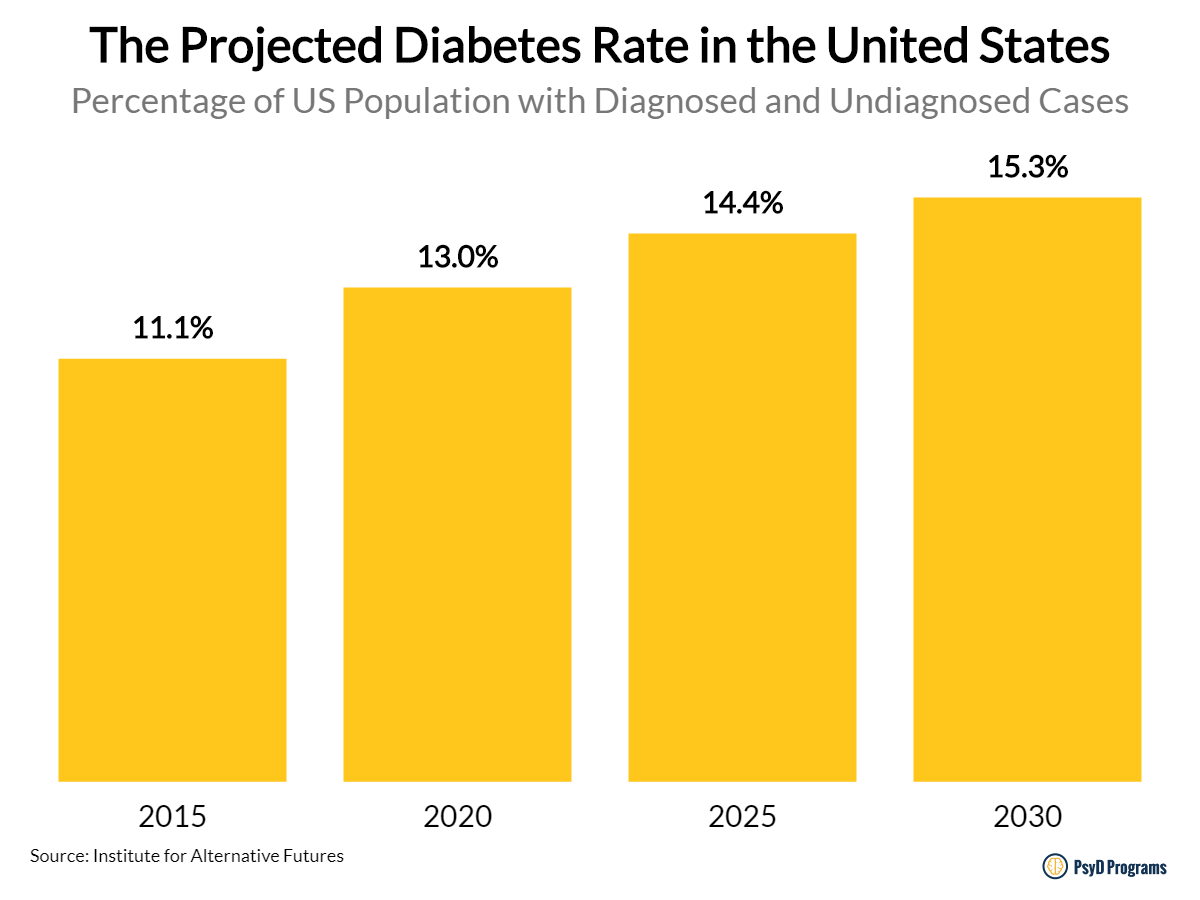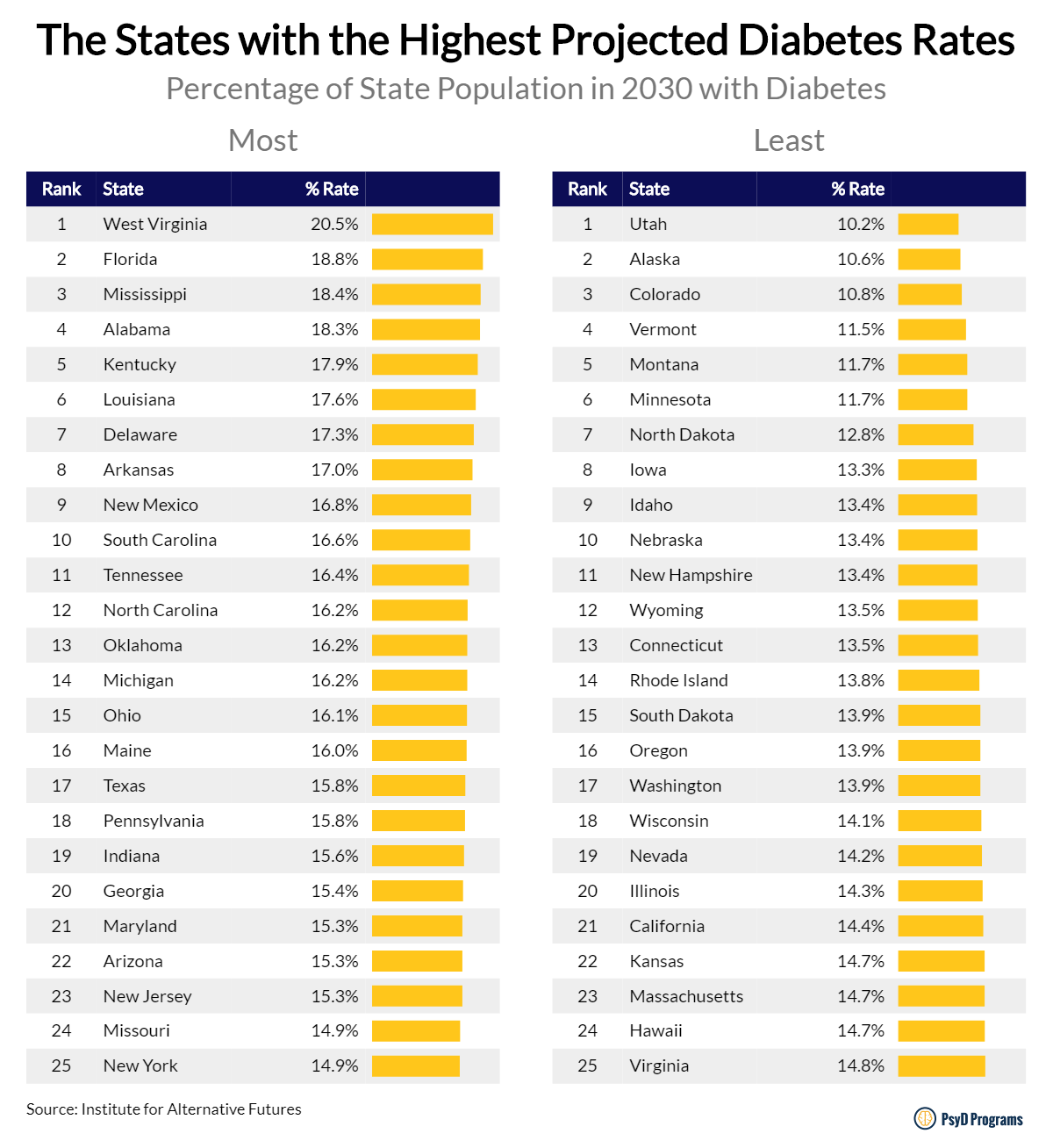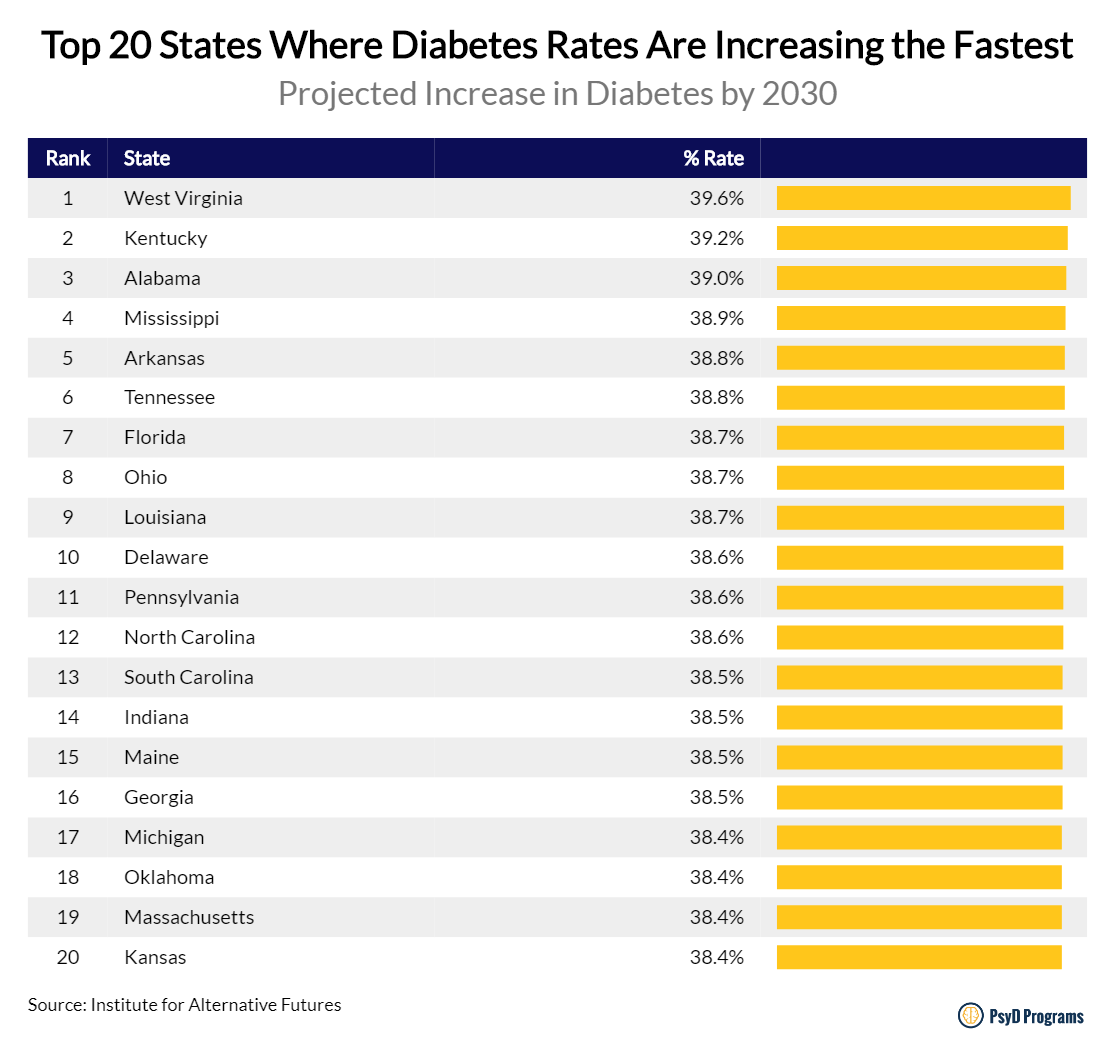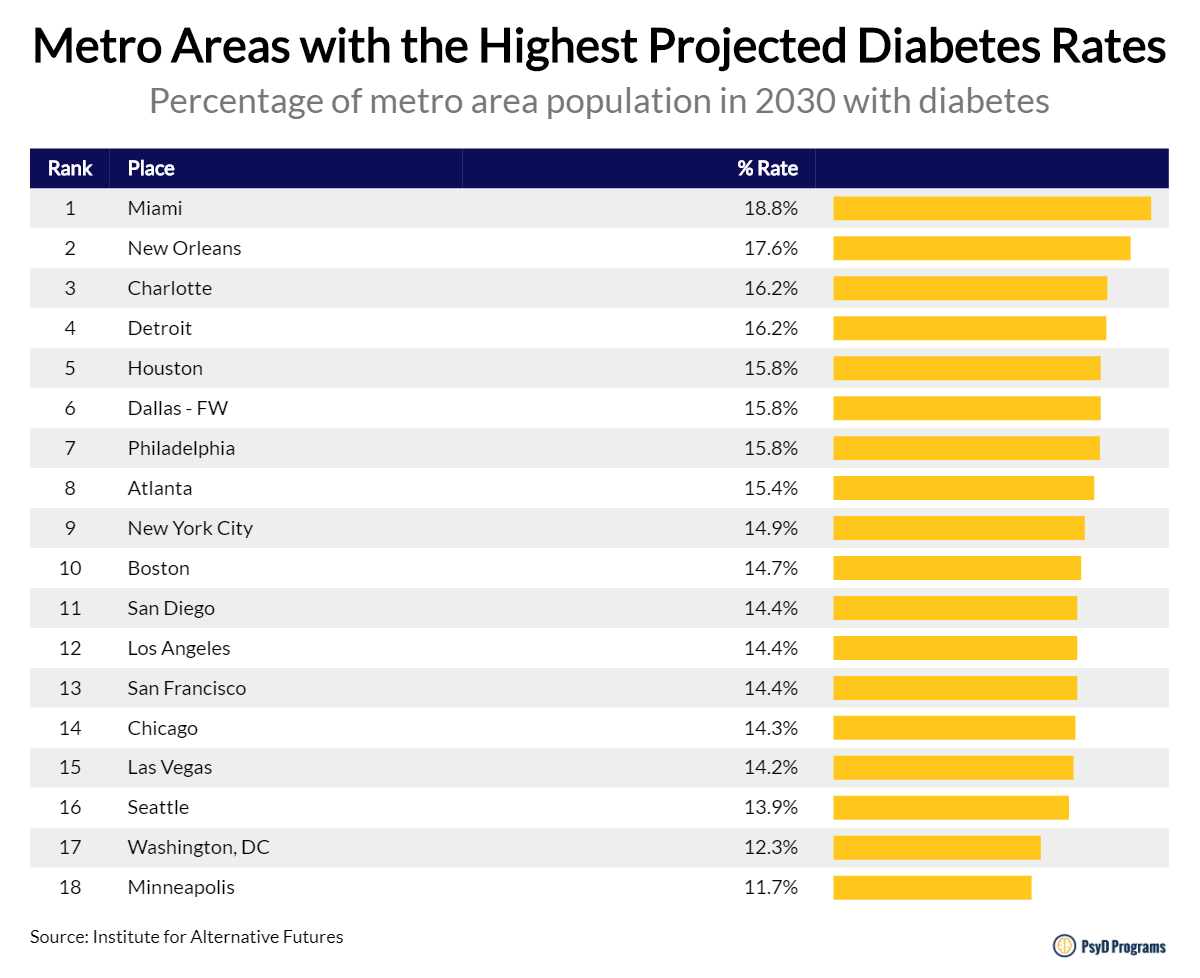
Today, over 30 million Americans suffer from diabetes, with 71,000 limb amputations occurring annually due to complications, creating an enormous need for mental health support that costs over $412 billion each year in healthcare expenses.
The psychological impact is staggering. Depression affects 25-30% of diabetes patients, anxiety disorders are twice as common, and medication adherence problems affect up to 50% of patients. This creates unprecedented opportunities for health psychology careers focused on chronic disease management.
The Psychology Behind America’s Diabetes Epidemic
Leading psychology education community, PsyDPrograms.org, analyzed data from the Institute of Alternative Futures to understand the mental health implications of projected diabetes rates by state and major metro areas from 2015 to 2030, revealing massive career opportunities for future psychologists.
According to this analysis, the diabetes rate will increase 38% in America, creating an urgent need for qualified health psychologists.
By 2030, states like West Virginia will see over 20% of their population affected by diabetes**, creating substantial demand for mental health professionals specializing in chronic illness. Utah, with the lowest projected rate at 10%, still represents significant career opportunities for health psychologists. Among major metros, Miami’s projected 19% diabetes rate signals exceptional job prospects for psychology graduates.
Understanding Health Psychology Career Opportunities
Before exploring specific opportunities, let’s examine what health psychologists do in diabetes care. Health psychologists help patients develop coping strategies, improve medication adherence, manage diabetes-related anxiety and depression, and work with medical teams to optimize treatment outcomes.
The scope of this mental health crisis becomes clear when examining current trends. Starting in 2015, 11.1% of Americans had diabetes, but the psychological support infrastructure was already inadequate:
By 2030, the diabetes rate in America is projected to rise by 38% to reach 15.3% of the population, creating unprecedented demand for health psychology services.
The American Diabetes Association estimates the economic cost of diabetes at $412 billion annually, with a significant portion attributed to mental health complications and poor treatment adherence that health psychologists are uniquely qualified to address.
Educational Pathways for Health Psychology Careers
Aspiring health psychologists interested in diabetes care have several educational options:
Doctoral Programs:
- APA-Accredited PsyD Programs with health psychology concentrations
- PhD vs PsyD programs – PsyD programs emphasize clinical practice, ideal for direct patient care
- Online PsyD programs offering flexibility for working professionals
Specialization Areas:
- Clinical Health Psychology
- Behavioral Medicine
- Chronic Illness Management
- Pediatric Psychology (for childhood diabetes)
State-by-State Career Opportunities for Health Psychologists
The geographic distribution of diabetes creates distinct career opportunities across America:
High-Opportunity States:
By 2030, West Virginia (20.8% diabetes rate), Mississippi (19.7%), Florida (18.4%), and Alabama (18.3%) will offer the most abundant career opportunities for health psychologists. These states desperately need mental health professionals specializing in chronic disease management.
Emerging Markets:
States like Utah (10.2% rate) and Colorado (11.8% rate) represent growing markets where health psychologists can establish innovative practices and become leaders in integrated diabetes care.
The fastest-growing diabetes markets create exceptional opportunities for early-career psychologists:
Career Growth Hotspots:
Over the next fifteen years, states showing 40% diabetes rate increases will need proportionally more health psychology services. Southern states dominate this list, correlating with areas that have historically underserved mental health needs.
Miami (18.9% projected rate), New Orleans (17.2%), and Charlotte (16.8%) represent prime metropolitan markets for health psychology practices. Even Minneapolis, with the lowest major metro rate at 11.7%, will have substantial patient populations requiring psychological support.
Health Psychology Salary and Career Outlook

The career outlook for health psychologists specializing in diabetes care is exceptionally promising. With over 30 million Americans currently diagnosed and another 88 million with pre-diabetes, the patient population continues expanding rapidly.
Career Settings and Opportunities:
Salary Expectations:
According to recent data, health psychologists earn competitive salaries that increase with specialization:
- Entry-level health psychologists: $75,000-$90,000
- Experienced diabetes specialists: $95,000-$120,000
- Private practice owners: $120,000-$180,000+
- Academic positions with research: $85,000-$130,000
Why This Field Matters:
The psychological aspects of diabetes management are critical. Depression, anxiety, and diabetes distress significantly impact treatment adherence, blood sugar control, and long-term health outcomes. Health psychologists provide evidence-based interventions including cognitive-behavioral therapy, motivational interviewing, and stress management techniques that demonstrably improve both psychological and medical outcomes.
Frequently Asked Questions About Health Psychology Careers in Diabetes
What education do I need to become a health psychologist specializing in diabetes?
You’ll need a doctoral degree in psychology, preferably a PsyD degree with health psychology emphasis, followed by an internship and postdoctoral training in medical settings. Many programs offer specialized tracks in chronic illness management.
Can I work with diabetes patients without medical training?
Yes, health psychologists work as part of integrated care teams. You’ll focus on the psychological aspects while collaborating with endocrinologists, diabetes educators, and other medical professionals. No medical degree is required.
What’s the difference between health psychology and clinical psychology in diabetes care?
Health psychology specifically focuses on how psychological factors affect health and illness, making it ideal for diabetes care. Clinical psychology is broader, while health psychology provides specialized training in medical settings and chronic disease management.
Are there online PsyD programs that prepare students for health psychology careers?
Yes, several accredited online PsyD programs offer health psychology concentrations. However, you’ll still need in-person clinical training and internships in medical settings.
What’s the job outlook for health psychologists?
Excellent. The Bureau of Labor Statistics projects 14% growth for psychologists through 2028, with health psychology showing even stronger demand due to aging populations and increased focus on integrated healthcare.
How do I find training opportunities in diabetes psychology?
Look for APA-accredited internships in medical centers, diabetes clinics, and hospitals. The American Psychological Association’s Division 38 (Health Psychology) provides resources and networking opportunities for students interested in this specialty.
Can health psychologists prescribe medication for diabetes-related depression?
In most states, psychologists cannot prescribe medication. However, some states now allow psychologists with additional training to prescribe. Most health psychologists work collaboratively with psychiatrists and primary care physicians for medication management.
Building Your Career in Diabetes Health Psychology
The intersection of psychology and diabetes care offers exceptional career opportunities for compassionate professionals who want to make a meaningful impact on patients’ lives. As diabetes rates continue rising across America, the need for qualified health psychologists will only grow.
Consider exploring accelerated 3-year PsyD programs to enter this field sooner, or hybrid programs that offer flexibility for working professionals.
The future of diabetes care is integrative, combining medical treatment with psychological support to optimize patient outcomes. By choosing a career in health psychology, you’ll be at the forefront of this evolution, helping millions of Americans live healthier, more fulfilling lives despite their diabetes diagnosis.
Fair Use Statement
Information is power. Please share our content for educational purposes. All we ask is that you link back to this page and give proper credit to our author.
About PsyDPrograms.org
PsydPrograms.org is the largest online psychology graduate community for students seeking PsyD degree programs, helping thousands of mental health career professionals each month. Over the past 10 years we have been online, we have helped tens of thousands of readers make more informed decisions involving graduate psychology PsyD degree & career decisions including a better understanding of a Ph.D. vs PsyD degree designation.











